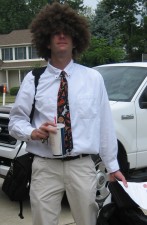Contact Paul Hasenmeier at 419-656-5884 to host one of these powerful conversations for your organization, conference, college, or local training event.
It’s Not A Costume – No Excuses Firemanship – (2 hours)
Some have heard me say “It’s not a costume”. Those we serve and those we serve with expect nothing but our best when we cross the doorplate, handle routine responsibilities, and even when heading to a meeting. Don’t think for one minute that putting on turnout gear makes you an all-purpose superhero those we serve expect. There is no magic switch that gets flipped to combine experience, education, and training on a moment’s notice. It takes work on the front end to prepare you for the challenges and assignments you face. All of us can do more to be faster and smarter at our craft. Know your job and do your job.
Certain things others do make your skin boil on the job. Is it a rookie firefighter that doesn’t think pulling and racking a hoseline again is important? Is it a seasoned firefighter that doesn’t want to participate in physical fitness training? Is it a crew boss that spends more time in the office than on the bay floor? Is it a chief officer that is disconnected from the mission of taking care of people? This presentation will help all of us improve upon the direction of ourselves, our crew, and our organization through strategic accountability. Then, we will talk about real fires, real strategy, real tactics, and real tasks to bring it all together to improve firemanship.
We have to work harder to get rid of laziness, complacency, and a lack of accountability to be better today then we were yesterday. If you set the expectations for yourself high, others will follow.
Evaluation Strategies: Making Leaders Out Of Our People (3 hours)
Evaluations of any kind are extremely difficult, even for the most seasoned mentor, instructor, or supervisor. This presentation will provide attendees with the knowledge on how to evaluate objectively. Attendees will be instructed on strategies and techniques that will help evaluate performance. Recommended ways to improve performance and give every employee a chance at success will be discussed. Most importantly, the evaluation process will be shown to be beneficial and not the stereotypical disciplinarian.
 The process of evaluating probationary employees, seasoned veterans, and students are different in their own right. Strategies and techniques learned in this presentation will apply to the many scenarios encountered. Whether mentors need measurable progress to report to their supervisor about a new hire, instructors need performance measurement criteria to evaluate a student’s course completion, or supervisors want to correct small glitches in performance and reinforce positive efforts. Through regular evaluation, positive developmental achievement can be reached in any organization.
The process of evaluating probationary employees, seasoned veterans, and students are different in their own right. Strategies and techniques learned in this presentation will apply to the many scenarios encountered. Whether mentors need measurable progress to report to their supervisor about a new hire, instructors need performance measurement criteria to evaluate a student’s course completion, or supervisors want to correct small glitches in performance and reinforce positive efforts. Through regular evaluation, positive developmental achievement can be reached in any organization.
The evaluation process is not meant to be a negative one. During this presentation students will learn the methods used to evaluate, goals of the evaluation process, difficulties associated with evaluating, and what errors to prevent when evaluating. Improving performance through objective evaluation is helpful to any employee trying to succeed.
Mentors, instructors, and supervisors must be proud of the people they are developing. The next generation of business transactions, surgeries, and building construction will be handled by the exemplary professional performance of those we evaluate, coach, and counsel.
 First Due Tackle Pass It On – Firefighter, Rescue & Extrication Training
First Due Tackle Pass It On – Firefighter, Rescue & Extrication Training